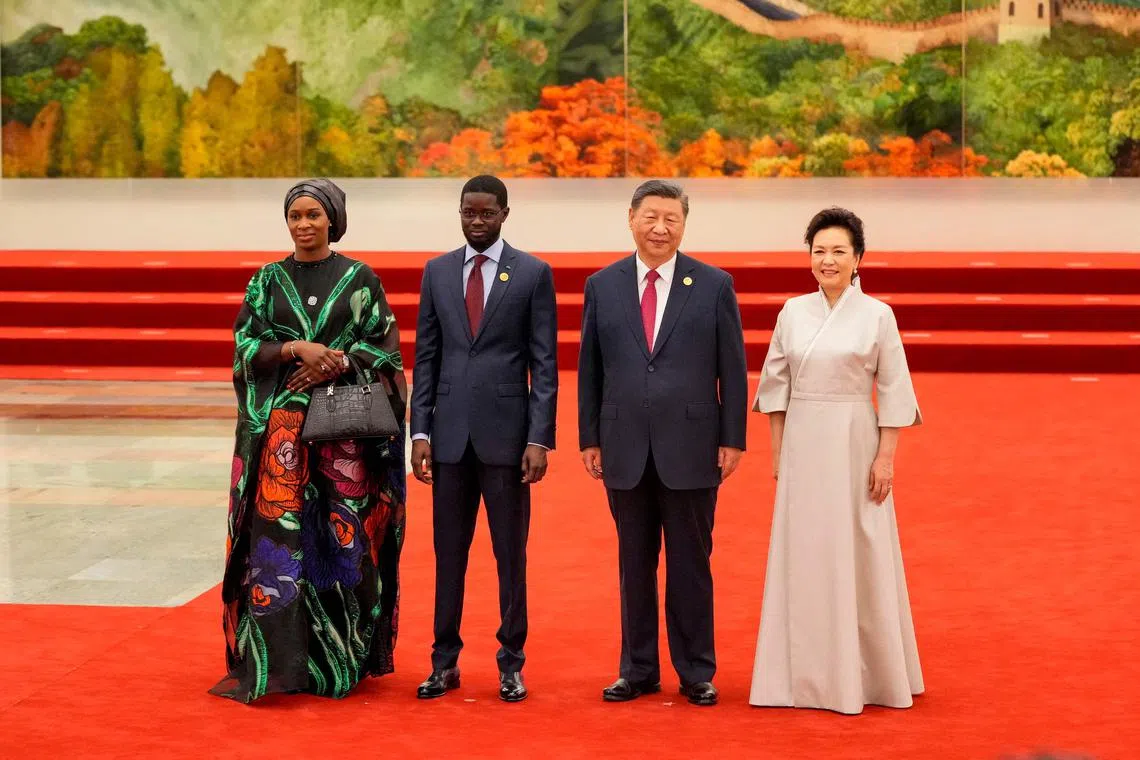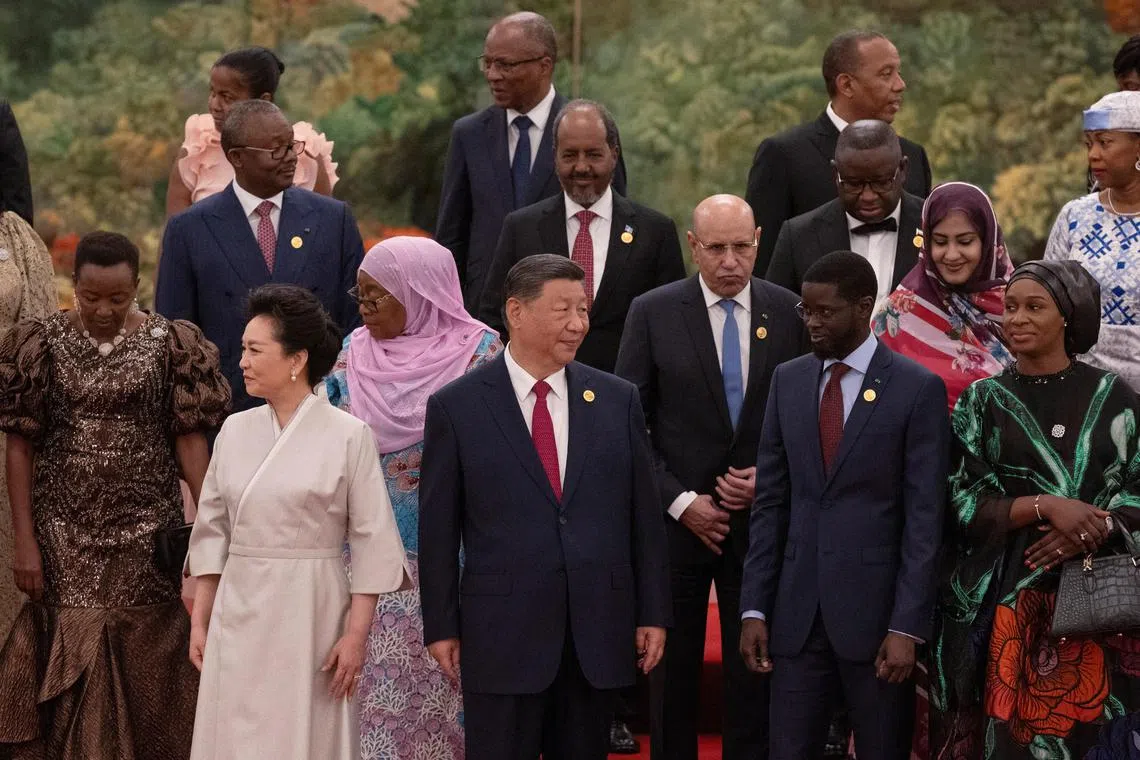Xi Jinping reiterates China’s commitment to Africa amid economic slowdown
Sign up now: Get insights on Asia's fast-moving developments

Chinese President Xi Jinping and his wife with Senegal President Bassirou Diomaye Faye (second from left) at the Great Hall of the People in Beijing on Sept 4.
PHOTO: AFP
Follow topic:
BEIJING – Chinese President Xi Jinping has pledged an additional 360 billion yuan (S$66 billion) to African countries, for initiatives ranging from infrastructure to security cooperation, as Beijing reaffirms its commitment to the largest bloc of developing countries despite an economic slowdown.
China-Africa relations are in their “best period in history”, Mr Xi declared on Sept 5 at the opening ceremony of the top-level Forum on China-Africa Cooperation
He called for elevating the relationship to an “all-weather China-Africa community with a shared future in the new era”, to applause at the Great Hall of the People in Beijing.
“China and Africa account for one-third of the world’s population. Without our modernisation, there will be no global modernisation,” Mr Xi said, adding that Beijing will provide 360 billion yuan of financial support in the next three years.
This is meant for initiatives in 10 areas including “high-quality” Belt and Road Initiative infrastructure projects, expanding market access to China and technology collaboration, as well as training and exchanges for military and law enforcement personnel.
The three-day summit is China’s largest diplomatic event since the Covid-19 pandemic, as it seeks to cement its growing political and economic ties with African countries. It is co-chaired by Mr Xi and Senegal President Bassirou Diomaye Faye.
China has pitched itself as the leader of the Global South – a term used to refer to developing countries, of which African countries form a major bloc – as Beijing seeks emerging markets and diplomatic allies for its core interests, such as Taiwan.
The vast majority of African countries recognise China over Taiwan, a self-governing island that Beijing views as its own territory, with the exception being Eswatini.
China has also touted its rapid development as an alternative model of modernisation to those offered by Western countries, and it wants to increase the voice of the Global South, for instance, in offering a peaceful solution to the Ukraine war.
Roadblocks and security presence have been stepped up in Beijing this week, as diplomatic delegations were shuttled from meetings to tours. Some schools reportedly ended earlier to avoid adding to traffic jams.
The event involves China, more than 50 African countries and the African Union, and takes place once every three years.
It is seen as the most important of the summits that Africa has with one other country, or “Africa Plus One” summits.
At the opening ceremony, Mr Xi sketched China-Africa ties as a bulwark amid “changes unseen in a century”, which is Beijing’s view of the way the international system is changing in a more multipolar world.
He added that modernisation is an inalienable right of all countries, “but the Western approach to it has inflicted immense suffering on developing countries”.
The 360 billion yuan pledged,
Mr Xi has been kept busy rolling out the red carpet treatment since Sept 2. A host of bilateral deals were signed, including in technology, agriculture trade, green energy and infrastructure such as roads and railways under Beijing’s Belt and Road Initiative.
China has been Africa’s largest trading partner for 15 consecutive years. While China-Africa trade reached a new high of US$282 billion (S$367 billion) in 2023, up from US$261 billion in 2022, African concerns over the trade deficit remain.
A Chinese pledge at the last forum in 2021 to reach US$300 billion in imports from Africa “in the next three years” appears unfulfilled. In 2023, China’s imports of African goods were worth US$109 billion.

Chinese President Xi Jinping (centre) and his wife with the leaders from African countries at the Great Hall of the People in Beijing on Sept 4.
PHOTO: REUTERS
On Sept 3, Mr Xi held talks with Nigeria President Bola Tinubu, and both sides agreed to export more Nigerian products to China, including peanuts. Nigeria is China’s second-largest export market in Africa, behind South Africa.
Technology cooperation is also an emerging domain in China-Africa ties. Mr Xi and South African President Cyril Ramaphosa on Sept 2 witnessed the signing of an agreement on the Beidou Navigation Satellite System, Beijing’s alternative to the US Global Positioning System.
Mr Sena Yao Voncujovi, an Africa-China policy analyst at development consultancy Development Reimagined, said China’s announcements are positive, as there have been worries that China is scaling back its investments or infrastructure projects on the continent given its own economic slowdown.
“The signal is clear that China is still deeply engaging Africa in financing large infrastructure,” he said, noting that the 360 billion yuan announced, or about US$50.8 billion, is about US$10 billion more than the sum committed at the last China-Africa forum in 2021.
While trade deficits have increased from US$43 billion in 2021 to US$64 billion in 2023, China has sought to address this, such as by expanding access to its market to more countries and supporting value addition in agricultural trade, said Mr Voncujovi.
Mr Eric Olander, co-founder of the China Global South Project website that tracks China-Africa relations, said that while the prospects for ties are strong, both sides are going to have different priorities.
African countries will largely look to China for economic engagement, such as trade, investment, loans and market access, while Beijing’s priorities regarding Africa are becoming increasingly political, he said.
A 30-item declaration by the leaders of China, 53 African countries and chairman of the African Union Commission on Sept 5 called for, among other things, upholding “mutual support on issues involving each other’s core interests and major concerns”.
Africa is not only a block of 54 votes at the United Nations, but it is also a strong coalition at international forums like the UN Human Rights Commission and the World Health Organisation, where China relies on its friends in the Global South to bolster its agenda, said Mr Olander.
“Moreover, a lot of African countries either abstain or back China on red-line issues related to human rights, such as Xinjiang, Taiwan and the South China Sea – all of which are incredibly important to China.”

